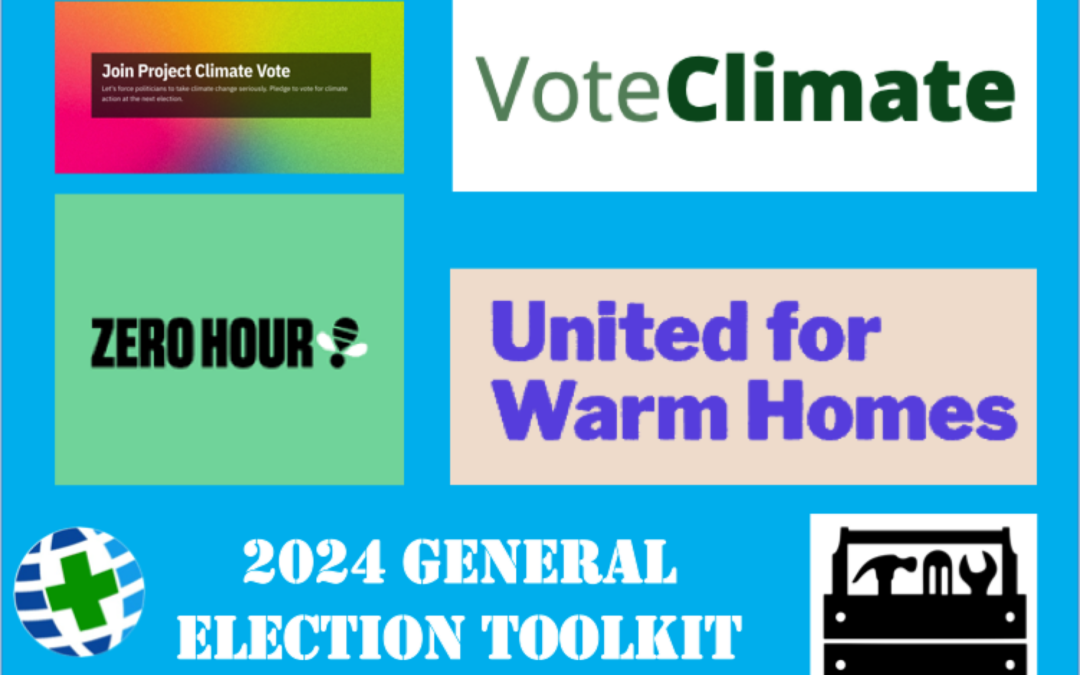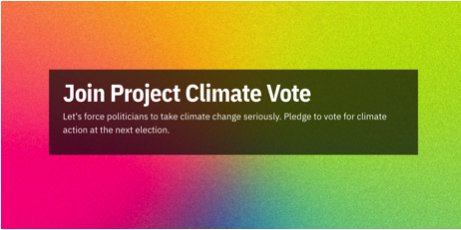A General Election is coming this year. But at this most vital time for the planet, it looks like the main political parties have decided they need to hide the climate and nature crisis away in a back room to avoid turning off voters. How can we tell them that there are millions out here who see the dangers vividly and want to give their vote to climate action? This Toolkit provides a simple guide to four of the national campaigns that have been launched recently to get climate onto the election agenda. It summarises their aims and approach, and explains how can you get involved. It also offers ideas for how climate groups can organise election hustings to stir debate in their own constituencies.
2024 is almost certainly going to be an election year. If you want to do something to get climate and nature onto the election agenda, now’s the time to start. Candidates will be listening and a range of national campaigns are emerging to grasp this moment. Some of the proposed actions are quick and easy (e.g. sign a pledge, put up a poster), others take more time. The campaigns complement each other – some target voters, some target candidates, some make an attempt to inform tactical voting for the climate. Together we can help to build up numbers and show candidates the tide of support for climate action in the South East.
At our SECA gathering on February 3rd we decided to produce an Election Toolkit to gather these ideas together. So here it is! If you hear of other campaigns/ideas let us know and we can update the toolkit as we get nearer to the elections.
Remember that if you are campaigning under the umbrella of SECA, Friends of the Earth, Greenpeace or any other similar organisation you need to remain politically impartial when campaigning i.e. don’t give any parties special treatment, and don’t advise people who to vote for.
Project Climate Vote
Organised by: Greenpeace
Aims/approach:
- “To build a movement to elect a Government with the will to act on climate change”
- Recruit at least a million ‘climate voters’, through social media, word of mouth and door knocking.
- Show parties how many voters will be prioritising climate action.
- Greenpeace will rank the manifestos and give voters comparative info on candidates’ climate credentials. This may have the power to make a difference, especially in marginal seats.
Quick Actions:
- Pledge to vote for the climate yourself and ask your friends.
- Put up a poster in your window I’m a climate voter”
If your have more time:
- Join a local Greenpeace canvassing group and go door knocking to get more pledges.
- Organise a canvassing group.
Comments:
It’s very easy to make your own pledge and gather pledges from friends. This is useful in itself – numbers are building up to show the support for climate action. Canvassing door to door can be daunting but good online training is provided and canvassing is done in groups. So far Greenpeace say that they are finding the public are receptive.
Vote Climate
Organised by: Vote Climate, an independent political movement started by a Ben Horton, who describes himself as ‘nerdy climate campaigner’.
Aims/approach:
- An online pledge campaign.
- “Maximise your vote to save the planet”. “ Empower ordinary people…to incentivise and pressurise the mainstream parties into taking the emergency seriously. We ….enable localised tactical voting to transform the next general election into a single-issue referendum on climate change”.
Quick Actions:
- Join the campaign. Just enter your postcode. You will receive info on tactical voting for the climate.
If your have more time:
- You can help out more by recruiting and promoting
Comments:
This doesn’t have a well-recognised national organization behind it, but it is another simple way to register your intention to vote for climate action. This campaign is trying to organise tactical voting on climate grounds.
Back the Climate and Ecology Bill
Organised by: Zero Hour
Aims/approach:
- Build up a giant online letter for each constituency signed by as many individuals and local community groups as possible.
- The letter invites candidates to pledge to support the CE Bill in Parliament (the Bill is about to be reintroduced).
- Gathering signatures from voters and local groups helps to build up momentum. Zero Hour will pick up those with over 100 signatures and advertise etc.
- Campaign pack
Quick Actions:
- Sign the open constituency letter yourself and ask some friends. Just enter your post code.
If your have more time:
- Rally local groups in your community/constituency to sign it too (councils, churches, WI, sports clubs, etc.)
- Add your postcode – there is a slot for signing as an organisation and uploading logos. Recruit other green groups around your constituency to help.
Comments:
This is a simple well-designed campaign. It looks fairly easy to build up pressure over a constituency. It asks candidates to make a specific commitment to back a powerful bill for climate and nature (the CE Bill requires the UK to meet targets, and gives a duty to implement a strategy created by a Climate and Nature Assembly and other bodies).

Warm Homes Pledge
Organised by: Friends of the Earth (FoE)
Aims/approach:
- To raise the profile of the FoE ‘United for Warm Homes’ campaign amongst candidates and get their pledges of support to invest at least £6 bn a year in a big home retrofit programme, especially to the neighbourhoods most in need.
- Contact local candidates and ask them to sign the Warm Homes Pledge
Quick Actions:
- Ask your candidates to sign the Warm Homes pledge
- Attend a FoE training session on preparing for the general election. There are sessions on a variety of topics – constituency data, running a hustings, etc.
If your have more time:
- FoE suggest writing to and meeting your candidates to ask them to take the warm homes pledge as this will have a bigger impact.
- They will be creating an Election Hub in March with lots of additional resources.
Comments:
The Warm Homes pledge is good campaign if you want to focus on a single, really important issue (Warm Homes) that addresses inequality, deprivation and cost of living as well as the climate. FoE also has a broader set of key FoE manifesto demands.
Run a local climate & nature hustings
Organised by: You!
Aims/approach:
- Bring climate and nature into the election spotlight in your community.
- Show candidates the depth of feeling on this issue.
- Allow voters to weigh up the candidates.
Quick Actions:
- Go to a hustings organized by somebody else and ask climate/nature questions
If your have more time:
- Organise your own hustings in your community.
There is some really useful advice on running a local hustings here:
Comments:
Organising your own hustings takes a lot of effort, but with a good chair and organising team its doable. It can create momentum in the lead up to the election and show your future MP that your community wants action.

2024 Local Elections
Lastly, we may not know when the General Election will be, but we do know that local elections will be held on May 2nd. After the impressive number of pledges in the 2023 local elections, SECA will be running our ABCD Climate Pledge campaign again this year. Last year we had more pledges than ever (292) and more than half these candidates were elected (154).
These are the councils with elections in the SECA area:
-
-
-
- Adur
- Basingstoke
- Crawley
- Elmbridge
- Eastleigh
- Fareham
- Gosport
- Hart
- Hastings
- Havant
- Maidstone
- Mole Valley
- Portsmouth
- Reigate
- Runnymede
- Rushmoor
- Southampton
- Tandridge
- Tunbridge Wells
- Winchester
- Worthing
- Woking.
-
-
Let us know if you are interested in taking part this year on ABCDpledge@gmail.com .
This Toolkit was prepared by Sally Barnard, with help from Brenda Pollack, Neil Pitcairn and Debbie Annells, who jointly facilitated the Vote for the Climate table at the February 2024 SECA Annual Gathering. If you have any suggestions for corrections or additions to the blog, please contact her at southeastclimatealliance@gmail.com




